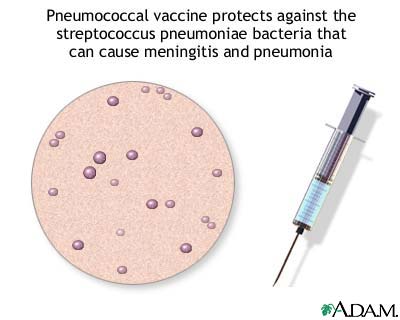Pneumococcal Polysaccharide Vaccine
Pneumococci organism

This picture shows the organism Pneumococci. These bacteria are usually paired (diplococci) or appear in chains. Pneumococci are typically associated with pneumonia, but may cause infection in other organs such as the brain (pneumococcal meningitis) and blood stream (pneumococcal septicemia). (Image courtesy of the Centers for Disease Control and Prevention.)
Pneumococcal pneumonia

This is a photomicrograph of the organism that causes pneumococcal pneumonia. The bacteria are round, but join together to form chains. Frequently, these join together to form pairs and are called diplococci; the prefix di means two.
Pneumococcal vaccine

Pneumococcal vaccine is an immunization against Streptococcus pneumoniae, a bacterium that frequently causes meningitis and pneumonia in the elderly, and people with chronic illnesses. Pneumococcal pneumonia accounts for 10 to 25% of all pneumonias.
The pneumococcal polysaccharide vaccine helps protect against severe infections due to the bacteria Streptococcus pneumoniae. This bacteria frequently causes meningitis and pneumonia in older adults and those with chronic illnesses. The vaccine has not been shown to prevent uncomplicated pneumonia.
VACCINE INFORMATION Pneumococcal is an inactivated-bacteria vaccine, which means it uses inactive bacteria to teach the immune system to recognize and fight active bacteria, if it is ever detected. This vaccine effectively prevents illnesses caused by Streptococcus pneumoniae in children over age 2 and adults at risk. IMMUNIZATION SCHEDULE The vaccine is recommended for: One single dose of the vaccine is given by injection. One dose works for most people. However, re-vaccination is recommended for people over age 65 who received their first dose before age 65 and more than 5 years ago. Other high-risk people, including those with weakened immune systems and spleen problems, may also need a second dose. You should speak with your doctor about specific reasons for vaccination and revaccination. The pneumococcal polysaccharide vaccine does not protect against pneumococcal diseases in children under age 2. There is a different vaccine, the pneumococcal conjugate vaccine, which is routinely given to younger children to protect against disease due to Streptococcus pneumoniae.
No comments:
Post a Comment